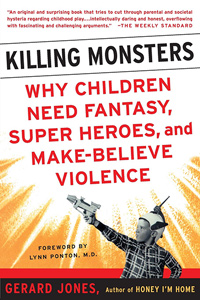Video games, especially so-called “violent” games, are the latest in a long string of new entertainment media to be accused of “ruining the youth of America.” Video games as the cause of all sorts of societal ills have been preceded by dime novels, comic books, violent TV shows, and movies and songs with sexy or racy lyrics. In 2002, Gerard Jones published Killing Monsters: Why Children Need Fantasy, Super Heroes, and Make-Believe Violence (Basic Books), the first book, as far as I know, to critically examine the hysteria over alleged effects of make-believe violence in the media on children. It focused on all media, not just video games, and concluded that such media posed no threat.
Since Jones’ 2002 book, video games, especially violent video games (hereinafter VVGs), have been the focus of worry that VVGs lead to adolescent violence, even school shootings (think Columbine), and are as addictive and dangerous as drugs. Markey and Ferguson show in their new book Moral Combat that not only are video games, even the violent first-person shooter games, innocent of the charges made against them, video games can and do have positive influences on their players. The authors begin with a brief history of video games and other supposedly harmful media. For example, psychiatrist Fredric Wertham, a crusader against comic books, believed that comics caused juvenile delinquency and that Batman and Robin encouraged homosexuality. His 1954 book Seduction of the Innocent (Rinehart) was an important part of the crusade against comics. It turns out that Wertham “overstated and potentially even fabricated much of his data” (p. 32) that he used to castigate comics.
Markey and Ferguson argue, correctly in my view, that the crusade against video games is a moral panic akin to that seen in the panic over ritual satanic child abuse. Throughout the book they make the interesting point that the crusade is led by those who have little familiarity with the video games they attack, the gamers involved, or the gaming culture that has grown up around the games. They note that the researchers who do research aimed at showing the games’ deleterious effects are largely older individuals who have little knowledge of the gamers or contact with the gamers. […]

No comments:
Post a Comment